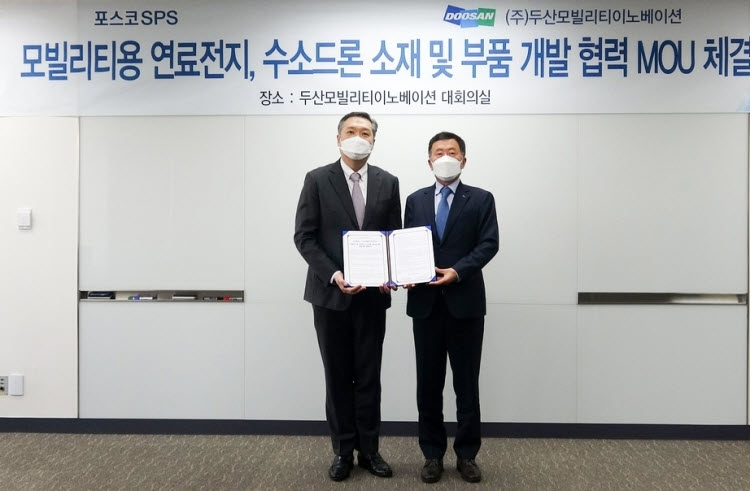
- Team up to Develop a 20μm-thick ultra-thin metal separator* for fuel cells for hydrogen drones.
Doosan Mobility Innovation (DMI), a company that makes portable fuel cell power packs, announced on Thursday that it has teamed up with POSCO SPS, a steel processing company, to create a key component for hydrogen fuel cell power packs for drones.
DMI will produce metal plates with a thickness of 20 micrometres for hydrogen storage under a preliminary agreement with POSCO SPS, a subsidiary of POSCO International Corp.
Lightweight fuel cells used for aviation mobility such as hydrogen drones are particularly important and require a high level of technology. DMI has already developed a 50μm (micrometer, 1 millionth of a meter) metal separator with POSCO SPS and applied it to a hydrogen fuel cell power pack for drones. The 50μm metal separator is the thinnest of the existing separators, and is about half of the metal separator (thickness 80μm~100μm) used in hydrogen vehicle fuel cells.
Through this agreement, the two companies will take a step further from their existing technology and jointly develop a 20μm metal separator, while seeking opportunities to enter various mobility businesses such as cargo drones and urban air traffic (UAM). I did it. When the development of the 20μm metal separator is completed, it is expected that it can be applied to a wider variety of fuel cells in the aviation mobility field.
DMI CEO Doo-Soon Lee said, “The metal separator is a very important component that contains 450 units per hydrogen drone, and DMI is a key technology for advancing into various business fields such as Cargo drones.” Through the synergy of processing technology, we will strive to develop technologies and products that can be applied to various mobility fields.”
On the other hand, DMI signed a business agreement for joint development of hydrogen robots with China’s robotics company Zhongshin Heavy Industries and Kaicheng Intelligence in February, and is expanding its business area. In addition, it plans to enter the cargo drone business by developing a 15kW fuel cell with a 50μm metal separator.
DMI commercialized the world’s first industrial drone powered by a hydrogen fuel cell. DMI’s drone uses hydrogen fuel cells, which has the advantage of flying over 2 hours beyond the limit of battery drones with a flight time of about 30 minutes. Accordingly, the product is highly evaluated in that it can perform tasks such as inspection, survey, search and rescue, and exploration of infrastructure facilities that are difficult for humans to do.
Read the most up to date Fuel Cell and Hydrogen Industry news at FuelCellsWorks




